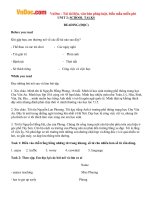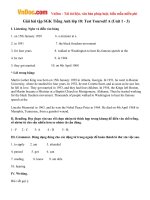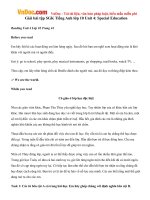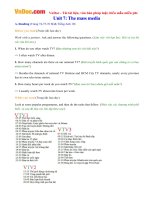Giải bài tập SGK tiếng Anh lớp 10 Unit 16 HISTORICAL PLACES
Bạn đang xem bản rút gọn của tài liệu. Xem và tải ngay bản đầy đủ của tài liệu tại đây (328.43 KB, 11 trang )
VnDoc - Tải tài liệu, văn bản pháp luật, biểu mẫu miễn phí
Giải bài tập SGK tiếng Anh lớp 10 Unit 16 HISTORICAL PLACES
A. Reading (Trang 166-167-168 SGK Tiếng Anh 10)
Before you read (Trước khi bạn đọc)
Work in pairs. (Làm việc theo cặp.)
- List some historical places you know in Vietnam. (Hãy kể tên vài địa danh lịch sử mà em biết ở Việt
Nam.)
President Ho Chi Minh's Mausoleum, Cu Chi Tunnel, The Huc Bridge, One Pillar Pagoda, Hoi An
Ancient Town, Independence Palace, ...
- Is Van Mieu - Quoc Tu Giam a historical places? (Văn Miếu - Quốc Tử Giám có phải là địa danh lịch
sử không?)
Yes, it is.
- What do you know about this place? (Bạn biết gì về địa danh này?)
While you read (Trong khi bạn đọc)
Read the passage and then do the tasks that follow. (Đọc đoạn văn và sau đó làm các bài tập theo sau.)
Hướng dẫn dịch:
Văn Miếu - Quốc Tử Giám là một di tích lịch sử và văn hóa nổi tiếng ở Hà Nội. Được xây
dựng vào năm 1070 thời nhà Lý, Văn Miếu là tượng trưng cho cách nghĩ và ứng xử theo
nho giáo. Sáu năm sau Quốc Tử Giám, trường đại học đầu tiên của Việt Nam được thành
lập trên mảnh đất của Văn Miếu. Từ năm 1076 đến 1779, Quốc Tử Giám đã đào tạo hàng
ngàn nhân tài cho đất nước. Năm 1482 Văn Miếu là nơi tưởng nhớ các nhà bác học kiệt
xuất của đất nước. Tên họ, nơi sinh và thành tích của các học giả hàng đầu trong các cuộc
thi hương được khắc trên những tấm bia đá. Những tấm bia này được những chú rùa khổng
lồ cõng trên lưng, ngày nay vẫn còn đứng vững và thu hút sự thích thú của nhiều du khách.
VnDoc - Tải tài liệu, văn bản pháp luật, biểu mẫu miễn phí
Sau hơn 900 năm tồn tại, Văn Miếu là một ví dụ về nét kiến trúc truyền thống của Việt
Nam được giữ gìn cẩn thận. Những cây đa ở Văn Miếu, đã chứng kiến nhiều lễ hội và các
cuộc thi hương trong suốt thời kỳ phong kiến, vẫn sum suê. Văn Miếu - Quốc Tử Giám là
niềm tự hào dân tộc của người Việt Nam.
Task 1. Choose A, B, or C that best suits the meaning of the italicised word. (Chọn đáp án A, B, hoặc C
mà gần nghĩa nhất với từ in nghiêng.)
1. B
2. A
3. C
4. B
5. C
originally = initially: ban đầu, lúc đầu
representative = typical: tượng trưng, điển hình, tiêu biểu
memorialize = honor: tôn vinh, tưởng nhớ
engrave = carve: khắc
flourish = grow well: phát triển
Task 2. Decide whether the following statements are true (T) or false (F). (Xác định xem các phát biểu
sau là đúng (T) hay sai (F).)
1. F
2. T
3. F
4. F
5. T
6. T
After you read (Sau khi bạn đọc)
Work in groups. Talk about Van Mieu - Quoc Tu Giam, using the suggestions below. (Làm việc nhóm.
Hãy nói về Văn Miếu - Quốc Tử Giám, sử dụng các gợi ý bên dưới.)
- Why is Van Mieu - Quoc Tu Giam a place of interest? (Tại sao Văn Miếu - Quốc Tử Giám là một địa
danh?)
=> Because it is a famous historical and cultural relic. It was representative of Confucian ways of thought
and behaviour.
- When and where were they built? (Chúng được xây dựng vào năm nào và ở đâu?)
=> Van Mieu was built in 1070 in the Ly Dynasty in Ha Noi. Quoc Tu Giam was established six years
later on the grounds of Van Mieu.
VnDoc - Tải tài liệu, văn bản pháp luật, biểu mẫu miễn phí
- What were their functions? (Nhiệm vụ của chúng là gì?)
=> Van Mieu was a place to memorialize the most brilliant scholars of the nation while Quoc Tu Giam
educated thousands of talented men for the country.
- What is special about the stelae there? (Có điều gì đặc biệt về các bia mộ ở đây?)
=> The names, places of birth and achievements of top students in royal exams were engraved on stone
stelae which were carried on the backs of giant tortoises.
B. Speaking (Trang 169-170 SGK Tiếng Anh 10)
Task 1. A foreign visitor has taken some notes about President Ho Chi Minh's Mausoleum. Ask and
answer questions with a partner, using his notes. (Một du khách nước ngoài đã ghi chép đôi điều về Lăng
Chủ Tịch Hồ Chí Minh. Hỏi và trả lời các câu hỏi cùng với một bạn học, sử dụng phần ghi chép của ông
ấy.)
Câu hỏi và trả lời gợi ý:
A: Where is President Ho Chi Minh's Mausoleum situated?
B: It is situated in Ba Dinh district in Ha Noi.
A: When did the construction of the Mausoleum start?
B: It started in September 1973.
A: When did it finish?
B: It finished in August 1975.
A: How many floors are there in the Mausoleum?
B: There are three floors.
A: What is the use of each floor?
VnDoc - Tải tài liệu, văn bản pháp luật, biểu mẫu miễn phí
B: The first floor is a stand for important meetings organized at Ba Dinh Square. The second floor is a
place where the late president is lying and the third floor is the roof.
A: On what days can we visit the Mausoleum?
B: We can visit it every day, except Monday and Friday.
A: What are the visiting hours?
B: We can visit it from 7:30 to 10:30 am in summer and from 8:00 to 11:00 am in winter.
A: Can we visit the Mausoleum in October?
B: No, we can't. Because it is usually for maintenance.
A: Can we take photographs inside the Mausoleum?
B: No, we can't.
Task 2. Work in pairs. Take turns to act as a tourist guide and give a short introduction to either of the
historical places below, using the information given. (Làm việc theo cặp. Lần lượt đóng vai là một hướng
dẫn viên du lịch và giới thiệu ngắn gọn về một trong các địa danh lịch sử dưới đây, sử dụng thông tin đã
cho.)
Gợi ý:
Hue, the former imperial capital of Viet Nam, is on the romantic Huong river, not far from
the Truong Son Range. Hue is in the central Viet Nam, 645 km from Ha Noi and 1071 km
from Ho Chi Minh city. The construction started in 1805 and completed in 1832. Hue is
listed as a world cultural Heritage by UNESCO in 1993. Hue comprises three sections. The
Royal Citadel, the Imperial Enclosure and the Forbidden City. We can visit Hue everyday
from 8:00 am to 4:30 pm with the admission fee 55,000 VND each.
Task 3. Work in groups. Ask other members of the group questions about a historical place they have
been to or know about, note down the main information, and then report to the class what you have learnt
about that place. (Làm việc nhóm. Hỏi các thành viên khác trong nhóm các câu hỏi về một địa danh lịch
VnDoc - Tải tài liệu, văn bản pháp luật, biểu mẫu miễn phí
sử mà các bạn đó đã đến thăm hoặc biết đến, ghi chép các thông tin chính, và sau đó tường thuật lại cho
cả lớp những gì em đã được biết về địa danh đó.)
C. Listening (Trang 171-172-173-174 SGK Tiếng Anh 10)
Before you listen (Trước khi bạn nghe)
- Work in pairs. Look at the pictures then answer the following questions. (Làm việc theo cặp. Nhìn vào
tranh sau đó trả lời các câu hỏi sau.)
1. What are the names of the places? (Tên của các địa danh là gì?)
(1) Notre Dame Catheral in Ho Chi Minh city
(2) Ha Long Bay
(3) The Huc bridge (Hoan Kiem Lake) in Ha Noi
(4) Noon Gate in Hue Imperial City
2. Which of the places have you been to? (Bạn đã tới thăm địa danh nào trong các địa danh này?)
I have been to Ha Long Bay when I was eleven.
3. Which one would you like to visit most? Why? (Bạn muốn tới thăm địa danh nào nhất? Tại sao?)
I would like to visit Ha Long Bay because I like to sail on the sea and watch the scenery on the sea and
explore the stunning caves in Ha Long.
- Listen and repeat. (Nghe và lặp lại.)
merchant: nhà buôn, thương gia
pillar: cột
carved: khắc
vessel: thuyền lớn, tàu lớn
heritage: di sản
destination: điểm đến
ornamental: trang trí
certified: chứng nhận
While you listen (Trong khi bạn nghe)
VnDoc - Tải tài liệu, văn bản pháp luật, biểu mẫu miễn phí
Task 1. Listen and choose A, B, or C that best completes the sentence. (Nghe và chọn đáp án A, B, hoặc
C phù hợp nhất để hoàn thành câu.)
1. B
2. A
3. C
4. C
5. C
Task 2. Listen again and answer the following questions. (Nghe lại và trả lời các câu hỏi sau.)
1. Where is the ancient town of Hoi An situated? (Phố cổ Hội An nằm ở đâu?)
=> It lies on the Thu Bon river, 30 kilometres south of Da Nang.
2. What was Hoi An known as between the 16th and the 17th centuries? (Hội An được biết đến như là gì
vào giữa các thế kỉ 16th và 17th?)
=> It was known as a major trading centre in southeast Asia between the 16th and the 17thcenturies.
3. What is it now famous for? (Bây giờ nó nổi tiếng vì cái gì?)
=> Hoi An is now famous for its old temples, pagodas, small tile-roofed houses and narrow streets.
4. What the old houses in Hoi An like? (Các ngôi nhà cổ ở Hội An trông thế nào?)
=> They were made of wood and their pillars were carved with ornamental designs.
5. How old is the Assembly Hall of Cantonese Chinese Congregation? (Hội Quán Quảng Đông bao
nhiêu tuổi?)
=> It is 151 years old.
6. When was Tan Ky House built? (Nhà cổ Tấn Ký được xây dựng khi nào?)
=> It was built in 1855.
7. What is special about this house? (Điểm gì đặc biệt về ngôi nhà cổ này?)
=> The house now looks almost exactly as it did in the early 19th century.
8. When was Hoi An recognised by UNESCO as a World Cultural Heritage Site? (Khi nào Hội An được
công nhận bởi UNESCO là Di sản văn hóa thế giới?)
VnDoc - Tải tài liệu, văn bản pháp luật, biểu mẫu miễn phí
=> In 1999.
After you listen (Sau khi bạn nghe)
Work in groups. Talk about the ancient town of Hoi An, using the following cues. (Làm việc nhóm. Hãy
nói về Phố cổ Hội An, sử dụng các gợi ý sau.)
TAPESCRIPT - Nội dung bài nghe:
The ancient town of Hoi An lies on the Thu Bon river, 30 kilometres south of Da Nang. It
was formerly a major trading center in Southeast Asia between 16th and 17th centuries. Hoi
An was also an important port for Dutch, Portuguese, Italian, Chinese, Japanese and other
merchant vessels from the Far East.
Hoi An is famous for its old temples, pagodas, small tile-roofed houses and narrow streets.
All the house were made of wood and their pillars were carved with ornamental designs.
One of the main attractions of Hoi An is the Japanese Covered Bridge, which was built in
the 16th century and is still well-preserved. All visitors to Hoi An are recommended a visit
to the Assembly Hall of Cantonese Chinese Congregation. This house was built in 1855
and still keeps many precious objects that belonged to the Chinese community of Hoi An.
Another attractive address to tourists is Tan Ky House, which was constructed nearly two
centuries ago as a house of a Vietnamese merchant. The house now looks almost exactly as
it did in the early 19th century.
In recent years, Hoi An has become a popular tourist destination in Viet Nam. In 1999, it
was certified by UNESCO as a World Cultural Heritage Site.
D. Writing (Trang 174-175 SGK Tiếng Anh 10)
Describing a chart (Miêu tả một biểu đồ)
Task 1. The chart on the right presents some information about visitor arrivals in Vietnam from the USA,
France and Australia in 2001 and 2002. Study the chart and then answer the questions that follow. (Biểu
đồ ở bên phải biểu diễn một số thông tin về các lượt du khách từ Mỹ, Pháp và Úc đến Việt Nam vào năm
2001 và 2002. Hãy nghiên cứu biểu đồ và sau đó trả lời các câu hỏi theo sau.)
VnDoc - Tải tài liệu, văn bản pháp luật, biểu mẫu miễn phí
1. According to the chart, which country had the biggest number of visitors to Vietnam in 2001? (Theo
biểu đồ, quốc gia nào có lượng du khách đến Việt Nam vào năm 2001 lớn nhất?)
=> The USA had the biggest number of visitors to Vietnam in 2001.
2. How many French visitors arrived in Vietnam in 2001? (Có bao nhiêu du khách người Pháp đến Việt
Nam vào năm 2001?)
=> 99,700 French visitors arrived in Viet Nam in 2001.
3. Which country had the smallest number of visitors to Vietnam in 2002? (Quốc gia nào có lượng du
khách đến Việt Nam năm 2002 ít nhất?)
=> Australia has the smallest numder of visitors to Viet Nam in 2002.
4. Is the number of Australian visitors coming to Vietnam in 2001 greater than that in 2002? (Có phải
lượng du khách người Úc đến Việt Nam vào năm 2001 nhiều hơn vào năm 2002 không?)
=> No, it isn't.
5. Which country, France or Australia, had more visitors to Vietnam in 2002? (Quốc gia nào, Pháp hay
Úc, có nhiều du khách đến Việt Nam vào năm 2002 hơn?)
=> France has more visitors to Viet Nam in 2002.
6. How did the number of American visitors to Vietnam in 2002 increase in comparison with in 2001?
(Lượng du khách người Mỹ đến Việt Nam năm 2002 tăng như thế nào khi so với năm 2001?)
=> The number of American visitors to Viet Nam in 2002 increased by 29,497 in comparison with that in
2001.
VnDoc - Tải tài liệu, văn bản pháp luật, biểu mẫu miễn phí
Task 2. Based on the answers to the questions above, write description of the chart provived in Task 1.
(Dựa vào các câu hỏi ở trên, viết đoạn văn miêu tả biểu đồ đã cho trong Bài tập 1.)
Đoạn văn miêu tả gợi ý:
The chart shows the number of visitors arrivals to Viet Nam from the USA, France, and
Australia in 2001 and 2002. From the chart the numder of visitors to Viet Nam from the
USA, France and Australia in 2002 is higher than that in 2001. According to the chart, the
USA has the biggest number of visitors to Viet Nam with 230,470 visitors in 2001 and
259,967 in 2002. France ranks the second with 99,700 visitors in 2001 and 111,546 in 2002.
Australia is slightly fewer visitors than France although the number of Australian visitors to
Viet Nam increased from 84,085 in 2001 to 96,924 in 2002.
E. Language Focus (Trang 175-176-177 SGK Tiếng Anh 10)
Grammar and vocabulary (Ngữ pháp và từ vựng)
Comparatives and superlative (So sánh hơn và so sánh nhất)
Exercise 1. Write the comparative and superlative forms of the adjectives. (Viết dạng so sánh hơn và so
sánh nhất của các tính từ sau.)
Adjective
Comparative
Superlative
1. cheap
cheaper
the cheapest
2. expensive
more expensive
the most expensive
3. young
younger
the youngest
4. happy
happier
the happiest
5. big
bigger
the biggest
6. busy
busier
the busiest
VnDoc - Tải tài liệu, văn bản pháp luật, biểu mẫu miễn phí
7. intelligent
more intelligent
the most intelligent
8. beautiful
more beautiful
the most beautiful
9. bad
worse
the worst
10. far
farther/further
the farthest/furthest
11. new
newer
the newest
12. dangerous
more dangerous
the most dangerous
Exercise 2. Put the words in the correct order to make sentences or questions. (Hãy xếp các từ theo đúng
thứ tự để tạo thành câu hoặc câu hỏi có nghĩa.)
1. I am the oldest in my family.
2. My sister is younger than me.
3. Who is the oldest in class?
4. Concord used to be the fastest passenger plane in the world.
5. Your book is more interesting than my book.
6. Peter bought the most expensive watch in the shop.
7. Did you buy the cheapest watch in the shop?
8. German is more difficult than English.
9. The weather today is much better than yesterday.
Making comparisons (Làm so sánh)
Exercise 3. Look carefully at each line. Some of the lines are correct, and some have a word which
should not be there. Put a tick (V) for each correct line. If a line has a word which should not be there,
write the word in the space. (Hãy xem kĩ mỗi dòng. Một vài dòng là đúng, và một vài dòng có một từ
VnDoc - Tải tài liệu, văn bản pháp luật, biểu mẫu miễn phí
không cần thiết. Tích dấu (V) cho mỗi dòng đúng. Nếu một dòng có từ không cần thiết, viết từ đó vào chỗ
trống.)
Transport solutions
First of all, walking is obviously the cheapest
V
means of travelling, and can be the quicker
the
in a city centre. Of course, the further you have
1. V
to go, the more so tired you will become.
2. so
In some ways, walking is more healthier than
3. more
travelling by bus or car, but it can be just as the
4. the
unhealthy because cities are the much more
5. the
polluted than they used to be. Cars are faster
6. V
of course and more than convenient, but as cities
7. than
become more of crowded, parking is getting
8. of
harder. Sometimes public transport is better,
9. V
eventhough buses don't go as fast as cars do it.
10. it
Cars are a lot more and convenient but as they
11. and
cause most pollution, it is the better to avoid
12. the
using them if possible. In a city the fastest way
13. V
of travelling is on a bike, which keeps you fitter
14. V
and is not so that noisy as a motorbike or a car.
15. that









